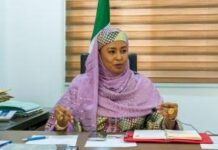By Francis Ogwo
Controversy seems to be brewing between the National Assembly and the Presidency on the distribution of the Social Investment Program of the present administration.
The National Assembly had argued that they were not comfortable with the modus operandi adopted by the federal government in distribution of welfare grants to Nigerians who suffer the impact of the coronavirus lockdown and called for a legislation for the programme in line with what it said was global best practices.
In a meeting with the Minister of Humanitarian Affairs, Disaster Management and Social Development, Safiya Farouq, Senate President, Ahmad Lawan, and the Speaker of the House of Representatives, Femi Gbajabiamila, had without mincing words made their views known on the subject which accused the criteria as selective .
In a swift response, the Special Adviser to the President on Social Investment, Maryam Uwais which described the claims by the lawmakers as false and dangerous.
A statement to that effect was issued on 8 April 2020 in response to the Senate President and the Speaker in which Uwais said “the demand for the inclusion of candidates to the NSR from the NASS has been a recurring issue from the inception of the NSIPs.
“My role and singular focus has simply been to comply with the terms of Agreement and the MoU entered into by the Federal Government of Nigeria, as well as to establish an objective, efficient and transparent process for uplifting the poor out of poverty through structures and mechanisms that are credible and sustainable.”
She was of the view that politicians should hands off on selection of beneficiaries of poverty alleviation
“I have consistently reminded both NASS Committee Chairmen on Poverty Alleviation that there is no social protection programme in the world in which politicians are responsible for selecting the beneficiaries of cash transfers.
“All successful social protection programmes extract their beneficiaries from an objective community platform, if only to ensure that the poorest of the poor are supported out of poverty in an inclusive community driven and timely manner.
“The process for objective identification of poor and vulnerable households is as provided in the Financing Agreement (F.A) signed between Nigeria and the World Bank, for which purpose the World Bank IDA Credit and the recovered funds from the Abacha family are being utilised.
“It should be noted that any departure from the process would place at risk the accessibility to the IDA Credit and the recovered funds from the Abacha family.
“The National Cash Transfer Programme derives all the cash transfer beneficiaries from a National Social Register (NSR), comprising State Social Registers that are developed and hosted by the State Ministries of Planning of each State.”
Mrs Maryam Uwais insisted that she is not in the habit of sending representatives to public hearings
“It is, however on record that all invitations to public hearings and meeting by the NASS were honoured by myself (as the supervisor of the NSIPs) and the cluster teams, while documents relating to the structure, activities and progress of the NSIPs were routinely shared with them, over the period that the NSIO supervised the NSIPs under the auspices of the Office of the Vice President (OVP).
“Furthermore, the monthly reports of 3,000 N-Power monitors, spread across the 774 LGAs, are available to both Poverty Alleviation Committees of the NASS.
“It should also be noted that the accounting and procurement aspects of the NSIPs were handled by the Ministry of Budget and National Planning on behalf of the NSIO, and not the OVP.
“All requests for information related thereto were responded to, by that Ministry.
It was further asserted, apparently, that because the beneficiaries are not known personally to the NASS members, the National Social Register is a ‘scam’ and needs to be reformed through a process that is ‘more inclusive’ of the NASS.”
Speaking further Maryam Uwais said “Although the total appropriation by the National Assembly (NASS) from inception, for the 4 NSIPs, is N1.7 trillion, the actual funds released for the NSIPs between January 2016 and October 2019 (when the NSIPs were handed over to the Ministry of Humanitarian Affairs, Disaster Management and Social Development), amounted to N619.1 billion, constituting 36.4% of the total appropriation from the NASS.
“The monies released for the N-SIPs can be further broken down into 14.03% (2016); 35% in 2017; 43.5% in 2018 and 57.8% (as at Sept 2019) of the N500b in 2016 and N400b appropriated for the subsequent years. It should be noted that for 2017 to 2020, the sum of N100b was appropriated specifically for the National Housing Fund hosted by the Federal Ministry of Finance.
“These releases covered operational activities and payments to 13,363,680 beneficiaries across all the 4 NSIPs, all of whom can all be verified either through their BVN numbers or their unique numbers generated by the National Social Register, those identities having been generated for the poorest of the poor who do not own bank accounts for sundry reasons.
“As at September 2019, the funds had been expended as follows, on the: Job Creation programme (549,500 N-Power graduates and non-graduates and 7 Technology Hubs); National Home Grown School Feeding Programme (in 33 States, 9,963,762 pupils to 107,862 cooks in 54,952 primary schools).
“The National Cash Transfer Programme (including the development of the National Social Register by the National Social Safety Net Coordination Office) 1,491,296 poor and vulnerable households comprising 6,056,872 individuals in 33 States and 620,947 cash transfer beneficiaries; and the Government Enterprise and Empowerment Programme (managed by the Bank of Industry); a total of 2,279,380 TraderMoni, MarketMoni and FarmerMoni beneficiaries.”
It would be recalled that the NSIPs include the school feeding programme for primary school pupils, the N-Power introduced for jobless graduates, the conditional cash transfer for elderly Nigerians, and the government empowerment programme that includes tradermoni which involves giving micro loans to small-scale traders.










